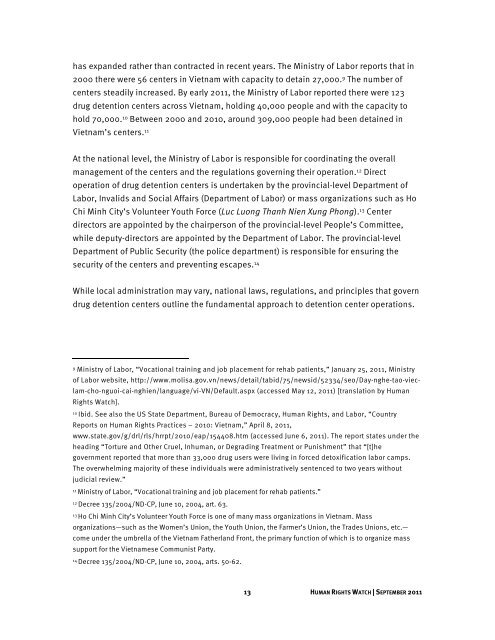The Rehab Archipelago - Human Rights Watch
The Rehab Archipelago - Human Rights Watch
The Rehab Archipelago - Human Rights Watch
Create successful ePaper yourself
Turn your PDF publications into a flip-book with our unique Google optimized e-Paper software.
has expanded rather than contracted in recent years. <strong>The</strong> Ministry of Labor reports that in<br />
2000 there were 56 centers in Vietnam with capacity to detain 27,000. 9 <strong>The</strong> number of<br />
centers steadily increased. By early 2011, the Ministry of Labor reported there were 123<br />
drug detention centers across Vietnam, holding 40,000 people and with the capacity to<br />
hold 70,000. 10 Between 2000 and 2010, around 309,000 people had been detained in<br />
Vietnam’s centers. 11<br />
At the national level, the Ministry of Labor is responsible for coordinating the overall<br />
management of the centers and the regulations governing their operation. 12 Direct<br />
operation of drug detention centers is undertaken by the provincial-level Department of<br />
Labor, Invalids and Social Affairs (Department of Labor) or mass organizations such as Ho<br />
Chi Minh City’s Volunteer Youth Force (Luc Luong Thanh Nien Xung Phong). 13 Center<br />
directors are appointed by the chairperson of the provincial-level People’s Committee,<br />
while deputy-directors are appointed by the Department of Labor. <strong>The</strong> provincial-level<br />
Department of Public Security (the police department) is responsible for ensuring the<br />
security of the centers and preventing escapes. 14<br />
While local administration may vary, national laws, regulations, and principles that govern<br />
drug detention centers outline the fundamental approach to detention center operations.<br />
9 Ministry of Labor, “Vocational training and job placement for rehab patients,” January 25, 2011, Ministry<br />
of Labor website, http://www.molisa.gov.vn/news/detail/tabid/75/newsid/52334/seo/Day-nghe-tao-vieclam-cho-nguoi-cai-nghien/language/vi-VN/Default.aspx<br />
(accessed May 12, 2011) [translation by <strong>Human</strong><br />
<strong>Rights</strong> <strong>Watch</strong>].<br />
10 Ibid. See also the US State Department, Bureau of Democracy, <strong>Human</strong> <strong>Rights</strong>, and Labor, “Country<br />
Reports on <strong>Human</strong> <strong>Rights</strong> Practices – 2010: Vietnam,” April 8, 2011,<br />
www.state.gov/g/drl/rls/hrrpt/2010/eap/154408.htm (accessed June 6, 2011). <strong>The</strong> report states under the<br />
heading “Torture and Other Cruel, Inhuman, or Degrading Treatment or Punishment” that “[t]he<br />
government reported that more than 33,000 drug users were living in forced detoxification labor camps.<br />
<strong>The</strong> overwhelming majority of these individuals were administratively sentenced to two years without<br />
judicial review.”<br />
11 Ministry of Labor, “Vocational training and job placement for rehab patients.”<br />
12 Decree 135/2004/ND-CP, June 10, 2004, art. 63.<br />
13 Ho Chi Minh City’s Volunteer Youth Force is one of many mass organizations in Vietnam. Mass<br />
organizations—such as the Women’s Union, the Youth Union, the Farmer’s Union, the Trades Unions, etc.—<br />
come under the umbrella of the Vietnam Fatherland Front, the primary function of which is to organize mass<br />
support for the Vietnamese Communist Party.<br />
14 Decree 135/2004/ND-CP, June 10, 2004, arts. 50-62.<br />
13 HUMAN RIGHTS WATCH | SEPTEMBER 2011

















